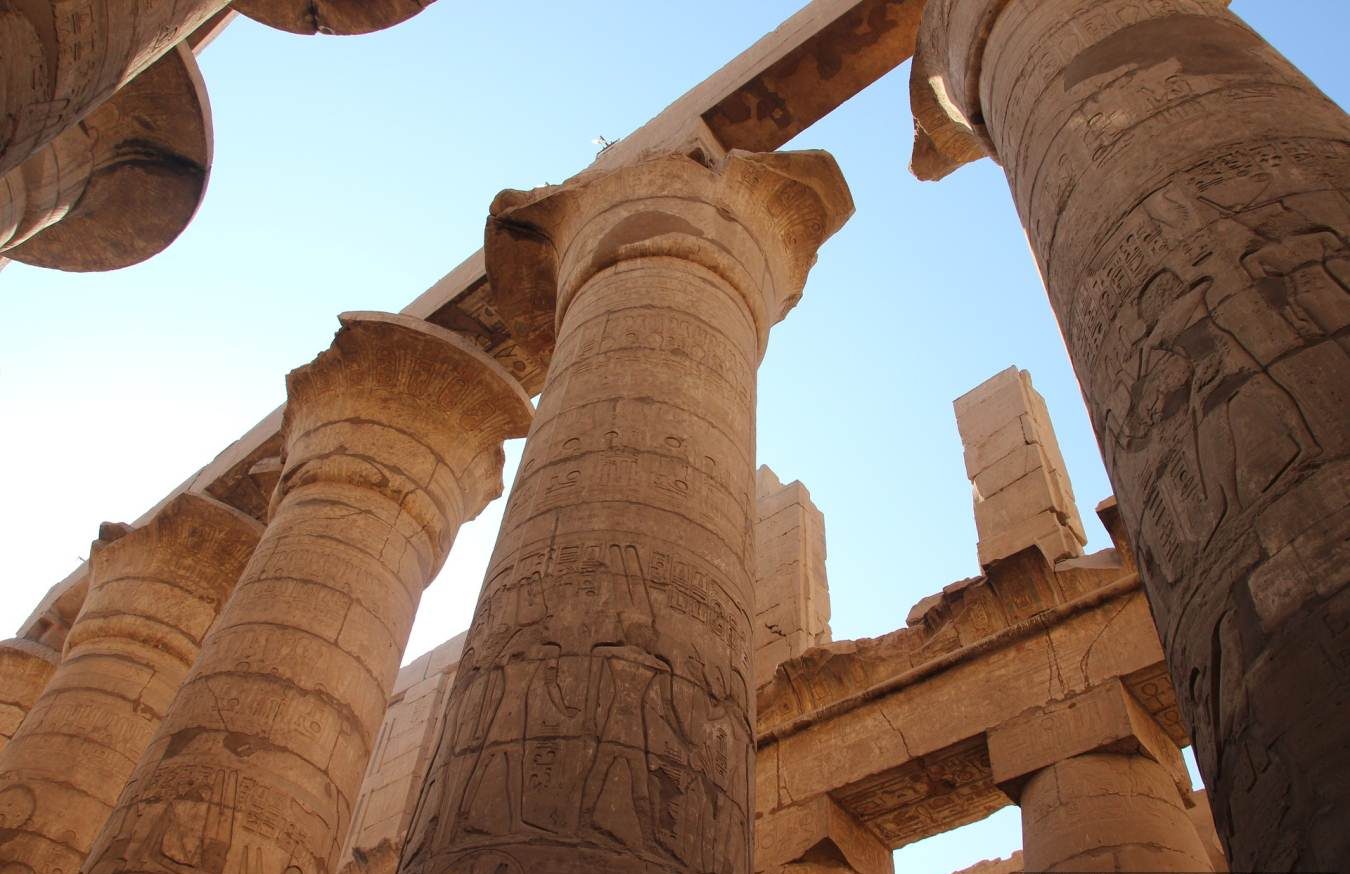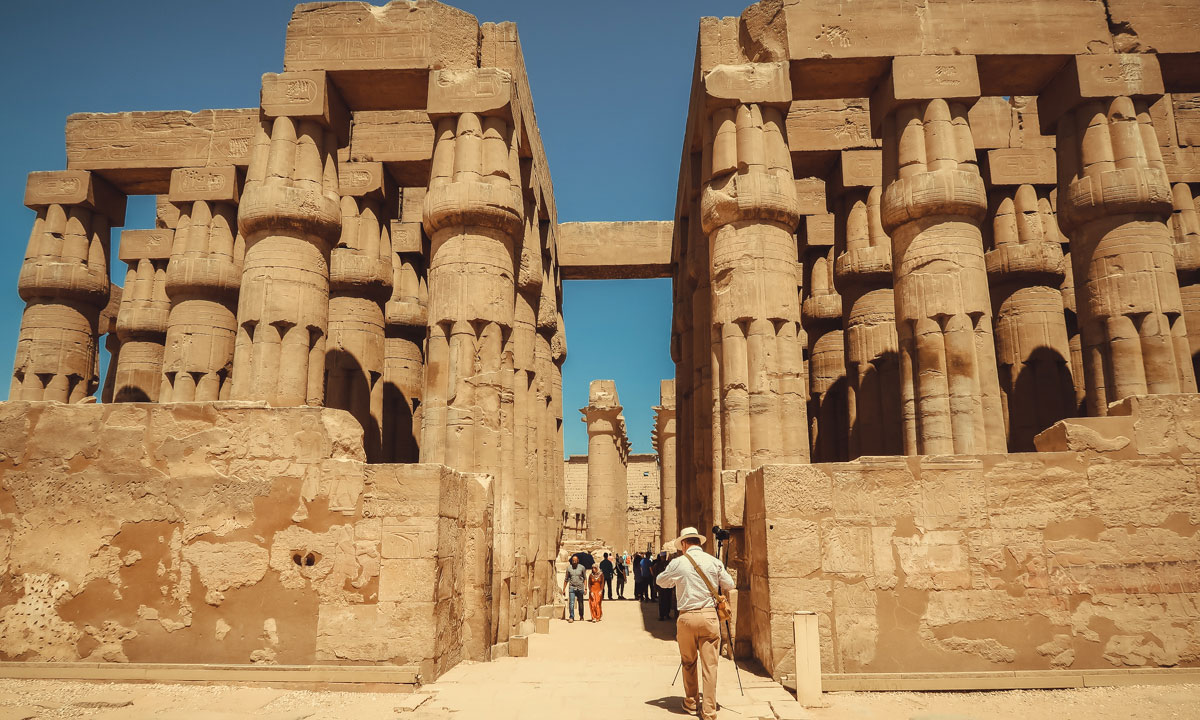
Luxor holds the power the sun able to give life and awaken the sense of beauty and wonder in the soul who wishes to cross the boundaries of time and space to witness the glory of Ancient Egypt in the most spectacular fashion. The main goal of this article is to offer every traveler the facts and information about the legendary city of Luxor. This article was written by a group of very skilled and professional tour guides, tour operators, and travel consultants who know all the details about the magical city of Luxor. Luxor is the home of ancient Thebes, one of the oldest and most inhabited cities on earth, the capital of the pharaohs in Ancient Egypt, during the height of their power from the 16th to 11th centuries B.C which explains why it became known as the city of immortal royalty.
Luxor, the city of a hundred doors is considered by many to be the globe’s greatest open-air museum as it holds some of the most majestic temples such as the Valley of the king, the Karnak temple, Queen Hatshepsut temple, and Luxor temple that holds some of the most extraordinary monuments and artifacts. Luxor is located in the south of Upper Egypt, on the east bank of the Nile River and part of the ancient city of Thebes. Luxor was considered to be a very important city during the old kingdom and the capital of Egypt during the New Kingdom.
Luxor is located in upper Egypt on the southern front on the east bank of the Nile river on an area of 417 sq km (161 sq mi) with a population of over half a million citizens who depends almost on tourism.
Luxor was a very important city as the Greeks named it “Thebes” and the ancient Egyptians called “Waset.”The current name "Luxor" means in Arabic Al-Uqṣur that means “The Palaces” or perhaps “The Forts,” from the Roman castrum and from the Latin castrum as the "fortified camp". Today Luxor is known in Arabic as “The Palaces” and during ancient times plus today by the known nickname “The city of Hundred Doors“.
The climate in Luxor is quite sunny and hot with average temperatures of 40 C (104 F) in the summer months and 22 C (71.6 F) during the winter months. The city has millions of visitors from all over the world to witness all the incredible wonders within this heavenly city.
 The history of Luxor shows us that the city had a deeply religious nature as it was known to be Thebes which means the city of Hundred doors and the city of Amun as it was the worship center for the Theban triad which consisted of the creator sun God Amun-Ra, His wife the goddess of truth & justice Mut and her son Khnosu the moon god. The city was known in ancient times to be the home of the god Amun and a physical embodiment of the relationship between Amun the God of gods and Egyptian royalty which Egyptian queens actually credited with fathering their own children. Luxor was very important during the 11th dynasty, the early middle kingdom (2050-1652 BC), the 12th dynasty (1938-1756 BC), and later in Egypt new kingdom as the city of the gods where the Karnak temple is the official place for worship as each god had a shrine-like Amun-Re, Mut and many more.
The history of Luxor shows us that the city had a deeply religious nature as it was known to be Thebes which means the city of Hundred doors and the city of Amun as it was the worship center for the Theban triad which consisted of the creator sun God Amun-Ra, His wife the goddess of truth & justice Mut and her son Khnosu the moon god. The city was known in ancient times to be the home of the god Amun and a physical embodiment of the relationship between Amun the God of gods and Egyptian royalty which Egyptian queens actually credited with fathering their own children. Luxor was very important during the 11th dynasty, the early middle kingdom (2050-1652 BC), the 12th dynasty (1938-1756 BC), and later in Egypt new kingdom as the city of the gods where the Karnak temple is the official place for worship as each god had a shrine-like Amun-Re, Mut and many more.
Luxor was a provincial administration center during the Old Kingdom collapsed, but with the rise of the middle kingdom in a time called the “first intermediate period.” the ancient city at Luxor became the capital of the new kingdom of Egypt. The importance of the city grows at the beginning of the 11th dynasty during the early middle kingdom leading to the new kingdom where the city became the capital and a universal hub for all the political, religious, and military aspects in Ancient Egypt. From the 18th to the 20th Dynasty, many kings and Queens established many temples to honor the gods as king Amenhotep III constructed the temple of the deity Amon, his consort the goddess Mut and their son Khonsu the moon good A.K.A Luxor temple in the late 18th dynasty, soon the power of Amon grow stronger as he was merged with the sun God Ra to Form Amun-RA who was worshipped in his temple in the Karnak Temples Complex.
King Akhenaton (1353-1336 BC) tried to enforce Monotheism as the way of the land when he moved the capital to the city of Amarna and force Atonism (the worship of the only god Aton) on the nation but he failed to do so after a period of civil war and unrest. During the new kingdom, a new set of constructions took place as many kings and Queens like Ramsess II (1279-1213 BC) and Hatshepsut (1507- 1458 BC) desired to immortalize their legacy plus it became a custom for any king or queen during the new kingdom to be buried in the valley of the kings as it holds 63 royal tombs such as the tomb of Ramses the great, Tutankhamen, Thutmose III, Nefertari and many more. Luxor is quite famous for the glorious temple of Hatshepsut that reflects the true artistic design and classical architecture of that era. One of the last characters to add something new to the city was Alexander the Great as a granite shrine of him was added to the Luxor temple.
The ancient Egyptian nature of Luxor hasn’t changed or decreased even when the Greek, Roman, Coptic, and Islamic Era came to Luxor and many churches and mosques were built near or even on some of the temples, Luxor still remained a window to the Ancient Egyptian History. The city of Luxor keeps surprising us with new discoveries every single day. Luxor along with the Karnak temples complex, the Valley of the Queens, and the Valley of the Kings, was declared a UNESCO World Heritage Site in 1979. Many excavations, restorations, and preservation efforts are still operating to this current day. In 1988 the Egyptian Antiquities Organization uncovered many 18th-dynasty statues. Modern Luxor is a market town that serves all the surrounding agricultural districts, plus the majority of the population is Christian. The town also has a railway station, an airport, and a ferry service to the western bank, plus The marvelous Luxor Museum was opened here in 1975 to offer travelers from all over the world a glimpse into the remarkable history and culture of ancient Thebes.
Luxor Tourist Attractions are universal treasures made of physical allure and grandeur. Located all over the city which made Luxor earn the title of being a World Heritage Site by UNESCO in 1979. At the first footsteps of the city exists the heavenly guardian the great Colossi of Memnon and in the heart of a mountain is the heavenly valley of the king home to 63 tombs for a number of royalty and nobles plus 20 tombs of kings and queens from the new kingdom period such as the Ramsess dynasty, Tutankhamun, Seti I, Amenhotep I, Thutmose and many more. Another rare monument is the marvelous valley of the nobles that holds 500 tombs of nobility, governors, and tax collectors plus wall images and wall decorations that shows their daily lives in a very detailed manner.
The beautiful temple of Queen Hatshepsut was built in 1479 BC which represents the most ideal example of ancient Egyptian architecture and one of the most preserved temples in all of Egypt. The Great Luxor Temple a.k.a the southern sanctuary was built in 1400 BCE and is one of the oldest and most marvelous temples in Luxor which was dedicated to the Theban Triad.
The great Karnak temples Complex a.k.a the most selected of Places is one of the world's largest open-air museums that was dedicated to the documentation of the spiritual development of the entire ancient Egyptian society. Karnak temple complex is a heavenly treasure that used to be the most important place of worship in Ancient Egypt, filled with sanctuaries, kiosks, and obelisks dedicated to the god of ancient Thebes and the glory of pharaohs dating more than 3500 years. Luxor is dominated by the Temple of Amun-Ra, one of the world’s largest religious complexes. Karnak temple is popular for its hall lined with giant papyrus-shaped columns. Karnak temple complex is a heavenly treasure that used to be the most important place of worship in Ancient Egypt, filled with sanctuaries, kiosks, and obelisks dedicated to the god of ancient Thebes and the glory of pharaohs dating more than 3500 years. Most of the constructions were built by the pharaohs of the 18th to 20th dynasties (1570–1090 BC), The legendary 3 kilometer-long avenue of human-headed sphinxes that links the great Temple of Amun at Karnak with Luxor Temple is a true sight to behold.
There are amazing things to do in Luxor where every traveler will have the chance to explore all the ancient historical attractions across the city plus there are a number of shops and bazaars where you can buy some lovely souvenirs, board a marvelous hot air balloon, enter the sound and light shoe and witness the history of Ancient Egypt come to life. From Luxor every traveler has the chance to board a Nile cruise from Luxor to Aswan where all the attractions of Ancient Egypt can be explored fully, there is also the amazing Luxor Museum home to the rarest collection of ancient Egyptian Artifacts.
Egypt has wonderful attractions and activities so if you prefer to explore them; you can try our best Egypt holiday packages from UK, Nile River Cruise, and book the tour most suitable for you. Or if you are in Luxor city and prefer to explore the most famous archaeological sites in Luxor then you can visit our Luxor Excursions.
Day Trip from Luxor to Cairo by Plane For British Travelers Day trip from Luxor to C...
Tour Location: Cairo...
Tour to Luxor West Bank For British Travelers Tour to Luxor West Bank for British tr...
Tour Location: Luxor...
Tour to Edfu and Kom Ombo For British Travelers Edfu & Kom Ombo Tour from Luxor...
Tour Location: Edfu/Kom Ombo...
Trip to Dandara and Abydos from Luxor for British Travelers A Trip to Dandara and Ab...
Tour Location: Dandara/Abydos...









